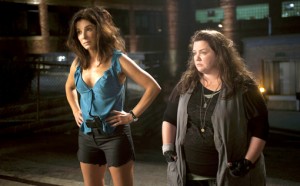The Heat
Posted on June 30, 2013 at 10:33 pm
B| Lowest Recommended Age: | Mature High Schooler |
| Profanity: | Constant strong and crude language, use of bad language as an expression of freedom |
| Alcohol/ Drugs: | Drinking, drunkenness (as an expression of freedom), scenes in bars, drug dealing and some drug use |
| Violence/ Scariness: | Law enforcement violence, chases, explosions, murder, torture, characters in peril, injured, and killed |
| Diversity Issues: | A theme of the movie, but a number of insults of a character with albinism |
| Date Released to Theaters: | June 28, 2013 |
| Date Released to DVD: | October 14, 2013 |
| Amazon.com ASIN: | B00BEIYJ8G |
 By my count, I have seen some sixty jillion buddy cop movies, and they follow a format as rigid as a sonnet. One cop is by-the-book. One is free-wheeling and impulsive. There is a frustrated superior officer. There is a scene in a nightclub. There is a bad guy with access to some inside information. One is catnip to the opposite sex; one is romantically challenged or solidly married. And our heroes, initially antagonistic, learn to respect, trust, and like each other. Some buddy cop movies have more comedy, some have more action. Some buddy cop movies are PG-13, some are R. There are always many wisecracks. Quite often, we get to meet the family of one or both. Sometimes the leads are white, sometimes they’re black, sometimes it is one of each. But all of them, all of them, all of them have one more thing in common. They’re both guys. Until now.
By my count, I have seen some sixty jillion buddy cop movies, and they follow a format as rigid as a sonnet. One cop is by-the-book. One is free-wheeling and impulsive. There is a frustrated superior officer. There is a scene in a nightclub. There is a bad guy with access to some inside information. One is catnip to the opposite sex; one is romantically challenged or solidly married. And our heroes, initially antagonistic, learn to respect, trust, and like each other. Some buddy cop movies have more comedy, some have more action. Some buddy cop movies are PG-13, some are R. There are always many wisecracks. Quite often, we get to meet the family of one or both. Sometimes the leads are white, sometimes they’re black, sometimes it is one of each. But all of them, all of them, all of them have one more thing in common. They’re both guys. Until now.
So thoroughly conforming to the conventions of the genre that the opening credits could have been lifted from a 70’s movie, “The Heat,” is not interested in breaking any new ground except for the considerable change of a gender switch. For the first time in decades, there is an action comedy with two female leads. It even passes the Bechdel rule. That is a major breakthrough. Everything else is, well, by the book.
Sandra Bullock, basically carrying over her “Miss Congeniality” role, is the by-the-book FBI agent named Ashburn. According to her supervisor, she has inspired “countless complaints of arrogance, competitiveness, and showmanship.” She is assigned to a new case and has to work with a tough, brash, impulsive, profane local cop named Mullins (Melissa McCarthy, basically carrying over her last three roles). “If you’re not in trouble, you’re not doing your job,” she explains. She also has an exasperated boss (Thomas F. Wilson, Biff the bully in “Back to the Future”).
Pretty soon they are battling over jurisdiction and getting caught as they both try to go through the doorway at the same time.
https://www.youtube.com/watch?v=J0HWlvP1xdkCue the wisecracks. “What is this, ‘Training Day?'” asks Ashburn. And there are some bonding moments, including a makeover in a nightclub ladies’ room, a joint appreciation of an impressive arsenal, and a drunken dance to “Groove is in the Heart” by Deee-Lite with Lady Miss Kier. But it feels like putting women in the lead roles was such a stretch they did not want to take any other chances with the genre.
They visit Mullins’ family, who appear to be visiting from “The Fighter.” (Nice to see Jane Curtin, Nathan Corddry, and NKotB-er Joey McIntyre, though.) Her brother’s girlfriend has breasts so significant to the character they deserve their own credit. Wait, they do. The girlfriend, Gina, is played by Jessica Chaffin, and the credits helpfully note that Gina’s boobs are played by “Jessica Chaffin’s boobs.” So, not quite the step forward for gender equality we might have hoped. And the Yale-educated Ashburn’s acid critique of a bad guy’s poor grammar loses some of its punch when she immediately follows it with a sentence that begins, with “me and her.” Not quite the step forward for literacy, then, either.
Bullock and McCarthy are both terrifically appealing and talented actresses and they have such evident pleasure in playing these roles that they are fun to watch. Maybe next time, though, they could put some more effort into the script.
Parents should know that this movie has non-stop strong, profane, and crude language with sexual references (and strong language is an expression of being free), drinking and drunkenness (including drinking as an expression of being free and open-minded and drunkenness as humorous), law enforcement violence with shooting, stabbing and explosions, murder, characters injured and killed, dead bodies, and drug dealing.
Family discussion: How are Mullins and Ashburn different from each other? How are they similar? Who is right, Mullins or her family?
If you like this, try: “The Other Guys” and “48 Hours”
